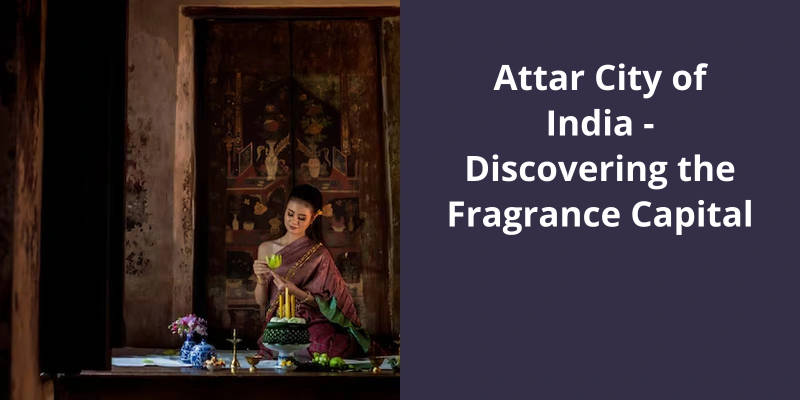The Attar City of India is Kannauj, located in Uttar Pradesh. Known for its rich history in perfume making, Kannauj specialises in crafting ‘attar’, a type of natural perfume extracted from flowers, herbs and spices. It’s a tradition that has been carried out for over 5 centuries. Skilled artisans distill these raw materials in traditional ‘deghs’ and ‘bhapkas’ systems, producing exquisite and unique fragrances. The city’s attar is in high demand both in India and internationally, making Kannauj the fragrance capital of the country.

What Country of Origin Is Attar?
Attar, the oily perfume that’s known for it’s rich fragrance, has it’s roots in both India and the Middle East. The term attar, derived from Arabic, can be translated to mean “scent” and is often used to describe the aromatic nature of this unique perfume. The word itself is believed to be derived from sugandha, a Sanskrit term which means “aromatic.”
India, in particular, has a rich history of attar production and is often referred to as the “Fragrance Capital” of the world. The art of making attar has been passed down through generations and is a cherished tradition in many Indian communities. The countrys diverse landscape, with it’s lush gardens and aromatic flowers, provides the perfect setting for attar production.
In India, attar is made using a process known as hydro-distillation. This involves soaking the aromatic flowers, such as jasmine, rose, or sandalwood, in water and then distilling the mixture to extract the essential oils. The resulting oil is then mixed with a carrier oil, such as almond or jojoba oil, to create the final attar product.
The Middle East also has a long-standing tradition of producing attar, with countries like Saudi Arabia, Egypt, and Iran being well-known for their attar production. Each region has it’s own unique style and preference when it comes to the choice of flowers and the blending process, resulting in a diverse range of attar fragrances.
Attar is treasured for it’s long-lasting scent, which is often described as warm, sensual, and captivating. It’s a popular choice among those who prefer natural, alcohol-free perfumes, as it’s believed to have a soothing effect on the skin and is less likely to cause allergies or irritations.
It represents the timeless art of perfumery and the beauty of natural fragrances, making it a truly special and cherished product.
The History and Cultural Significance of Attar in India and the Middle East
Attar is a highly valued aromatic oil derived from natural plant materials, such as flowers, herbs, and spices. It’s history can be traced back to ancient times in India and the Middle East. In India, attar holds a significant cultural importance as it’s been used for centuries in religious rituals, traditional medicine, and perfumery.
The city of Kannauj in India is renowned as the “Attar City of India” due to it’s rich heritage and expertise in the art of attar making. Kannauj has been the center of attar production for generations, with skilled artisans carefully extracting the oils from various botanical sources. The attars produced in Kannauj are highly coveted for their exquisite fragrances and superior quality.
In the Middle East, attar has been a cherished product since ancient times, with it’s usage deeply rooted in Islamic traditions. It’s often used during religious ceremonies and as a personal fragrance. The fragrance profiles of different attars vary, ranging from floral to woody, musky, or spicy, catering to diverse tastes and preferences.
Attar continues to be a prized commodity in India and the Middle East, embodying the rich cultural traditions and historical significance of these regions. It’s allure lies in it’s natural and pure composition, capturing the essence of nature’s fragrant offerings.
Attar, a popular fragrance in India and beyond, isn’t limited to any specific religious community. While it’s commonly used by Muslims before ‘Namaaz’, Hindus also incorporate the use of attar in their religious practices, such as during ‘Puja’. This aromatic essence holds significance for individuals of various faiths, highlighting it’s universal appeal and diverse cultural use.
Can a Hindu Use Attar?
In the diverse cultural landscape of India, the use of attar transcends religious boundaries. While attar is commonly associated with Muslim traditions, it isn’t limited to the Muslim community alone. In fact, attar is widely embraced by Hindus for various religious practices and ceremonies.
For Hindus, attar holds a significant place in the performance of Puja, a ritualistic worship conducted to honor deities. It’s believed that the delicate fragrance of attar helps purify the environment and create a spiritually uplifting ambiance during these sacred ceremonies.
The use of attar adds an ethereal touch to these celebrations, creating an immersive sensory experience for participants.
Moreover, the popularity of attar extends beyond Indian borders. Attar is equally embraced by individuals all over the world, regardless of their religious affiliations. It’s unique scent and association with Indian culture have made it a sought-after fragrance in the global market.
The Symbolism of Different Attar Fragrances: Discuss the Symbolism and Significance of Different Attar Fragrances in Hindu Rituals and Ceremonies.
- Mogra (Jasmine): Represents purity, spirituality, and divine beauty
- Champa: Symbolizes devotion, spirituality, and love
- Rose: Signifies love, romance, and compassion
- Saffron: Represents wealth, prosperity, and purity
- Sandalwood: Symbolizes peace, grounding, and spirituality
- Kewda: Signifies spiritual growth, enlightenment, and clarity
- Mitti Attar (Earthen): Represents simplicity, grounding, and connection to the earth
- Agarwood: Symbolizes spiritual awakening, mindfulness, and meditation
- Lotus: Signifies purity, spiritual enlightenment, and divine beauty
Conclusion
It’s rich history and heritage in the art of perfume production have granted it the prestigious title it rightfully holds. With it’s unique blend of tradition and innovation, the city has become a hub for aromatic marvels that have captivated not only the locals but also fragrance enthusiasts from around the world. As one delves into the streets of this mystical city, the intoxicating scents permeate the air, enticing visitors to discover the secrets hidden within it’s alleys. As we dive deeper into the realms of this captivating city, we realize that the fragrance of Kannauj extends far beyond the physical senses; it’s an embodiment of the soul of a nation, a celebration of India's olfactory heritage, and a mesmerizing journey into the captivating world of scent.





